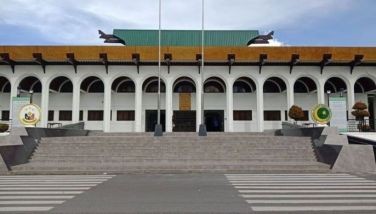Springtime in the church

In many places in the world, this is the season of springtime. The earth becomes radiant with symphony of colors. The cold and gloom of winter is replaced with flourishing evidence of life making spring a symbol of new life and new growth.
In the Philippines, where the tropical climate limits the experience of seasonal change to summer and rainy season, the notion of springtime is also known in reference to a fresh beginning.
Spring has a religious significance for some religions. This is the time for the religious observance of the Passover by the Jews. For the whole Christendom, particularly in Rome, the seat of Catholicism, the traditional Holy Week observance and ceremonies occur in spring.
Even the election of Pope Francis, which came about as a result of the unprecedented and unexpected resignation of Pope Benedict XVI, is seen as symbolic of springtime in the Church. The fresh approach and the amiable personality of the new Pope come as a new spingtime to the Vatican and to the rest of the Catholic faithful around the world.
The election of Pope Francis I, as the new Shepherd of the Catholic Church, is very much an existential springtime. In many ways, the Church is experiencing a fresh beginning. The new Pope is an unexpected break from the usual mold as he is from the New World (the Americas, specifically Argentina). He prefers the touch of ordinary life. Pope Francis takes on the governance and spiritual leadership of 1.2 billion Catholics around the globe even as he, then Cardinal Jorge Mario Bergoglio, was not even in the list of the most possible papabiles prior to the Conclave.
Hours before the conclave that elected the new pope, then Cardinal Jorge Mario Bergoglio stated that he would want to see the Church ‘not to be eschewed with self-absorption’ and focus its energies outward. The future Pope also warned against the dangers of stagnation stating that “when the Church does not emerge from itself to evangelize, it becomes self-referential and therefore becomes sick.†Pope Francis, not knowing that he would be elected, said he expected the top pastor of the Church of Rome to be “a man who, from the contemplation of Jesus Christ, helps the Church to emerge from itself to arrive at the existential limits.â€
Pope Francis has introduced new and personal ways of performing the responsibilities of the papacy, such as asking the faithful whom he faced from the Vatican balcony for the first time to pray for him instead of simply praying for them. It was not lost on the faithful who saw and heard him that first day that the new Pope brings so much refreshing simplicity and humility into the seat of Peter. It is as enlivening as the cool fresh wind of spring time to read about the simple lifestyle of Pope Francis, preferring to live in austere community conditions with his fellow cardinals in the Vatican Residence and riding with them in the cardinals’ bus after the conclave that elected him pope.
News reports show an emerging picture of a pope who is accessible and approachable. He sought out and mingled with the faithful after his first papal mass and he has continued this practice, much to the chagrin of his security people. The picture of well-worn black shoes the new Pontiff wore during his first audiences rather than the customized red shoes of his predecessors, speaks volumes about his simplicity.
These are simple yet significant images and impressions of the Pope who found his commitment for the poor at the heart of his papacy. The choice of the name Francis connects him to St. Francis of Assisi, his role model for holiness, poverty in spirit, simplicity, humility and obedience.
The relationality that Pope Francis brings into his pontificate bodes well for the Catholic Church. We now look forward to a church that will be more open and sensitive to the needs of the faithful, especially the poor. There is a building up of optimism that the task of evangelization and bringing the gospel to the limits of ‘existential outskirts’ will be the welcome fresh wind of springtime in the Church. To the over one billion Catholics around the world, the message of Evangelii Nuntiandi, the encyclical written by Pope Paul VI, will find depth, meaning and relevance regarding the need of the Church for more ‘witnesses’. Pope Francis I will lead the way.
- Latest
- Trending





























